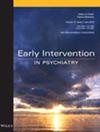The Role of Emotion in Psychosis Onset and Symptom Persistence: A Systematic Review
Abstract
Aim
Emotions have repeatedly been implicated in the development and maintenance of psychosis. However, there is no universally acknowledged theory to account for how emotions influence psychosis. This review, therefore, aims to explore how emotions and emotional coping strategies contribute to the onset and persistence of psychosis symptoms.
Method
A systematic review was conducted to summarise the existing evidence base regarding the role of emotions and emotional coping strategies across the psychosis continuum, including individuals at Clinical High Risk (CHR), those experiencing a First Episode of Psychosis (FEP), and those with a diagnosis of Schizophrenia (SZ).
Results
Seventy-eight studies were eligible for inclusion. Compared to Healthy Controls (HCs), SZ and CHR individuals demonstrated significant impairments in emotional awareness, emotional understanding of self and others, and emotional regulation, along with heightened emotional reactivity. In SZ, lower emotional awareness, negative emotional reactivity, and emotional dysregulation were significantly associated with increased positive symptoms. Individuals with SZ reported high levels of Negative Affect (NA) and low levels of Positive Affect (PA), with NA being a strong predictor of paranoia and rumination strengthening the affective pathway to paranoia. In terms of coping, CHR and SZ demonstrated significantly greater use of Maladaptive Coping Strategies (MCS) than Adaptive Coping Strategies (ACS) compared to HCs. MCS such as suppression were significantly associated with increased positive and negative symptoms, social withdrawal, and depression severity in SZ, while ACS such as cognitive reappraisal significantly decreased negative symptoms, depression, and social withdrawal and improved social functioning. Individuals with SZ predominantly employed Emotion-Focused Coping (EFC) rather than Problem-Focused Coping (PFC), which were associated with negative and positive outcomes, respectively.
Conclusion
These findings highlight the important role of emotion in psychosis onset and symptom persistence. Given the prominence of emotions in the manifestation and maintenance of psychosis, the development of emotion-focused interventions for psychosis is necessary to not only prevent transition and relapse but also to maintain recovery. To support clinical application, this review also provides Socratic questions and recommends practical therapeutic tools to assist clinicians in the assessment, formulation, and intervention of emotional dysregulation in psychosis.


 求助内容:
求助内容: 应助结果提醒方式:
应助结果提醒方式:


